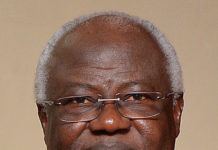
The idea of the All People’s Congress’ rogue establishment democracy in Sierra Leone has become so closely identified with elections that we are in danger of forgetting their modern history of representative elections is a tale of authoritarian manipulations as much as it is a saga of democratic triumphs. Generally, in other words, elections for the APC rogue establishment have been an instrument of rogue APC establishment authoritarian control as well as a means of democratic governance.
Since the early days of the All People’s Congress’ rogue establishment wave of national democratisation, it has been clear that their desperation to sustain their authoritarian rule to disenfranchise the suffering majority can lead anywhere. Over the past decade and a half, many have led to the establishment of some form of fake democracy. They have given birth to new forms of authoritarianism that do not fit into our classic categories of one-party, military, or personal dictatorship. They have produced a rogue establishment that holds elections and endures some pluralism and interparty competition, but at the same time violate standard democratic norms so severely and systematically that it makes no sense to classify them as democratic in nature, however, qualified.
The current APC rogue establishment does not represent little, defective, or distorted forms of democracy. It is an instance of authoritarian rule. The time has come to abandon the misleading labels of the APC rogue establishment and to take their non-democratic nature seriously even as they again revisit their manipulation menu in the coming lower-level APC elections.
The truth is the APC’s rogue establishment as an authoritarian regime, neither practices democracy nor resorts regularly to naked repression. By organising periodic elections they try to obtain at least a semblance of democratic legitimacy, hoping to satisfy external as well as internal actors. At the same time, by placing those elections under tight authoritarian controls they try to cement their continued hold on power at the expense of those that saw the need to reform the APC to meet to the test of times. The dream of the rogue APC establishment is to reap the fruits of electoral legitimacy without running the risks of democratic uncertainty. Balancing between electoral control and electoral credibility, they situate themselves in a nebulous zone of structural ambivalence.
Delimiting the blurry frontiers of electoral authoritarianism even in lower-level elections cannot help, but be a complex and controversial task. Perhaps the best way to get a handle on the problem is to take a fresh look at the normative presuppositions that underlie the idea of democratic elections within the APC establishment rogues.
But what does “democracy” mean in this context? How sharp is the distinction between “democratic” and “authoritarian” rogues? Political party democracy, many argue, is not a matter of “either/or” but of more or less: The APC rogue establishment must understand that democracy is not simply present or absent, but admits of degrees. They must learn how to understand that a qualitative difference separates democracy from authoritarianism. The APC rogue establishment is not less democratic than democracies, but plainly undemocratic.
The Cloudy Area
The hard but uncomfortable truth is the APC rogue establishment is clearly an authoritarian cabal meant to exploit the suffering majority. They settle in the wide and cloudy area between liberal democracy and closed authoritarianism. To order this cartel of very dangerous nationals masquerading as a political party establishment, others have been working with broad intermediate categories like “democratising political party” or “semi-democracy.” Some have been developing lists of more specific “diminished subtypes” such as “illiberal” or “delegative” democracy. Personally, I propose to fill the conceptual space between the opposite poles of liberal democracy and closed authoritarianism with two symmetrical categories: electoral democracy and electoral authoritarianism. The resulting fourfold typology captures significant variation in the broad area between the poles without abandoning the idea that a meaningful distinction may be drawn between democratic and APC rogue authoritarian establishment.
This is so because the distinction between liberal and electoral democracies derives from the common idea that elections are a necessary but not a sufficient condition for modern democracy. Such a rogue APC establishment cannot exist without elections, but elections alone are not enough. While liberal democracies go beyond the electoral minimum, electoral democracies do not. They manage to “get elections wrong from the outset” and go on failing to institutionalise other vital dimensions of democratic constitutionalism, such as the rule of law, political accountability, bureaucratic integrity, and public deliberation.
The distinction between electoral democracy and rogue APC establishment authoritarianism builds upon the common affirmation that democracy requires elections, not just any kind of elections.
They need to be fully democratic by nature.




